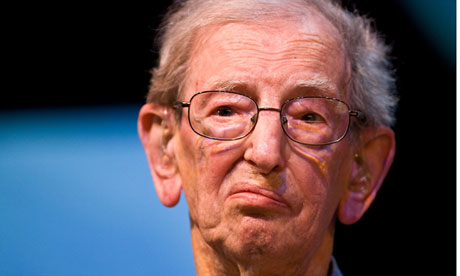by LUIS SUAREZ-VILLA
 British historian Eric Hobsbawm (1917-2012). PHOTO/David Levenson/Getty Images/Guardian
British historian Eric Hobsbawm (1917-2012). PHOTO/David Levenson/Getty Images/Guardian
Eric Hobsbawm (1917-2012), regarded by many as the top 20th century British historian, passed away October 1st, at the age of 95. Hobsbawm joined the British Communist Party in 1936, the year he entered Cambridge University, and remained a life-long member. In a life dedicated to historical scholarship and to draw attention to injustice and oppression, he became the best-known British Marxist scholar, inspiring generations of students to apply a dialectical perspective to history.
Hobsbawm’s numerous books — among them The Age of Revolution (1962), The Invention of Tradition (1983), Labouring Men (1986), The Age of Empire (1987), Nations and Nationalism Since 1780 (1990), The Age of Extremes (1994), The Age of Capital(1995), On History (1997), Revolutionaries (1999), Industry and Empire (1999), and How to Change the World: Marx and Marxism 1840-2011 (2011) — became great sources of social vision on the phenomena they covered: industrial capitalism, mercantilism, imperialism, socialism, revolution, industrial labor, politics, and nationalism. Among his later works, On Empire: America, War and Global Supremacy (2008) assessed American hegemony in comparison to British imperialism, and the use of terrorism to justify unilateral global deployment and control — a very insightful interpretation of our current global predicament and the injustices it harbors.
Often attacked by neoliberals and right-wing pundits for his ideas, Hobsbawm’s critics used the deaths of millions under Stalin’s rule — and similar regimes — to argue the superiority of capitalism. Such critics typically ignored a fundamental aspect — one that is rather obvious to most every Marxist historian. This is the fact that far more deaths have occurred under systems that can be considered capitalist — starting with mercantile capitalism in the 16th century and industrial capitalism in the 18th — as a result of wars over markets, resources, or slaves, because of poverty, exploitation, and injustices due to capitalist processes and market crashes, than have ever occurred in all the combined governments and regimes in history that neoliberals use to attack socialism. In India, for example, British mercantile capitalism submitted millions to slavery and death through the most inhumane conditions imaginable, in order to secure access to marketable resources. In China, the British-induced Opium Wars and the scourge of the drug — an immense tragedy created in the name of “free trade” — led to far greater mortality than that of the entire Chinese revolution led by Mao Zedong and the measures that followed. The slave trade from Africa by European mercantile — and later industrial — capitalists led to far more deaths than all of the combined 20th century regimes typically denounced by neoliberals in their tirades against Marxism.
Hobsbawm’s position when faced with such attacks was very honest and forthright. He never denied or excused the deaths of Stalin’s regime and similar ones, and he regretted that they occurred — difficult as it was to understand and come to terms with what happened. His ideas and politics were based on his hope for the betterment of human society and the human condition through socialism — a system whose values he regarded as more humane than any form of capitalism tried out so far. His objective grasp of history — no matter the political or economic system in question — allowed him to avoid turning it into a caricature of past human existence, as neoliberals are prone to do whenever they write on capitalism’s past. It was his remarkable capacity to be objective that made Hobsbawm’s scholarship shine and remain afloat amid the sea of detractors he had to confront — particularly after the 1970s, when neoliberalism swept away many of the restraints on capitalism that had created some measure of equity and social justice.
Monthly Review Zine for more
